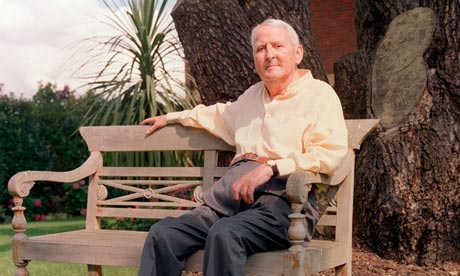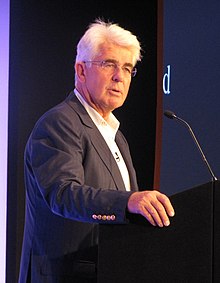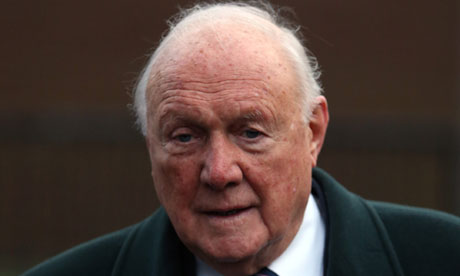Fearing that social media may actually have some teeth BBC Sport Presenter and Crown Court Judge Niclas Parry has responded to the letter written by the Catherine Scott. Catherine disgusted with Parrys remarks to a teenage rape victim of Rape that she had "let herself down" started a petition to get Parry to apologise.
The fact that the Court have decided to reply to Catherine is amazing in itself normally they ignore people who are not part of their little clique of solicitors or barristers. However we are quickly elucidated when we read his reply he decided to lie explaining in legalese how he actually said and meant the exact opposite of what he said and meant.
Judges who lie and obfuscate like this should be quickly relieved of their posts.
 |
| JUDGE NICLAS PARRY AS BBC SPORTS PRESENTER |
Catherine gives an update on her blog.
"Update on the petition asking Judge Niclas Parry to retract his victim-blaming comments
As you may or may not be aware, last month I started a petition in response to this news story.
In the petition, I asked Judge Niclas Parry to retract and apologise
for his comments to a rape victim that she had 'let herself down badly'.
Here's the text of the email I sent to Judge Parry, drawing his
attention to the petition:
"I am writing to ask you to
publicly apologise for, and retract your comments to the rape victim of
Anthony Parry that she 'let herself down badly' (reported December 14
2012, BBC News). To focus on the behaviour of the victim whilst
sentencing a guilty rapist sends out the message that rape is partially
the victim's fault. This is particularly concerning in light of the
recent Home Office report which found that rape conviction rates remain
pitifully low, and that many victims are afraid to report rape because
they fear them will be blamed.
Disbelieving or victim-blaming attitues from members of the criminal justice system have regularly been cited as a factor in discouraging rape victims from coming forward, so it is particularly disappointing that an influential figure such as yourself felt the need to imply that women are to blame for being raped if they have been drinking. This will only contribute to a culture where victims remain afraid to come forward and rapists continue to go unpunished.
Your words also go directly against one of the main premises of the Sexual Offences Bill 2003, as described in the Stern Report 2010 - namely that "sex without consent is always rape and all other factors about a person making a complaint of rape are irrelevant to that central fact". (The Stern Review 2010, Page 14)
Apologise for and retract your victim-blaming comments to this woman, and instead use your power as a member of the judiciary to send out an unequivocal message that rape is always 100% the rapist's fault.Sincerely etc"
Disbelieving or victim-blaming attitues from members of the criminal justice system have regularly been cited as a factor in discouraging rape victims from coming forward, so it is particularly disappointing that an influential figure such as yourself felt the need to imply that women are to blame for being raped if they have been drinking. This will only contribute to a culture where victims remain afraid to come forward and rapists continue to go unpunished.
Your words also go directly against one of the main premises of the Sexual Offences Bill 2003, as described in the Stern Report 2010 - namely that "sex without consent is always rape and all other factors about a person making a complaint of rape are irrelevant to that central fact". (The Stern Review 2010, Page 14)
Apologise for and retract your victim-blaming comments to this woman, and instead use your power as a member of the judiciary to send out an unequivocal message that rape is always 100% the rapist's fault.Sincerely etc"
After having to chase Mold Crown Court twice to obtain a response from
Judge Parry, I received the following reply on Jan 29 from the court
Listing Manager Jane Williams.
"His
Honour Judge Parry would wish to thank you for your message and for the
very valid points that you raise regarding the trying of cases such as
these.
He would also wish to explain why this is a case where the need for any apology would not arise but to explain also that that is only due to the circumstances of the particular case in question.
The reference to the Complainant was in face specifically made by His Honour because the Complainant herself had stated that she somehow feared that her behaviour might be seen as contributory and to emphasise to her and everyone else that, in fact, in his Honour's view, quite the contrary was true and that in fact the Complainant's condition was actually an aggravating feature which the Judge considered made the offence even worse and so merited a higher sentence.
For your information only, and hopefully to assist further, the Judge was in fact sent a letter from the Complainant's family thanking him personally for the manner in which he had dealt with the Complainant who had felt supported by him, and because of that, more able to pursue her complaint. The Judge was also thanked for what was considered by them to be an appropriate sentence.
Regards etc"
He would also wish to explain why this is a case where the need for any apology would not arise but to explain also that that is only due to the circumstances of the particular case in question.
The reference to the Complainant was in face specifically made by His Honour because the Complainant herself had stated that she somehow feared that her behaviour might be seen as contributory and to emphasise to her and everyone else that, in fact, in his Honour's view, quite the contrary was true and that in fact the Complainant's condition was actually an aggravating feature which the Judge considered made the offence even worse and so merited a higher sentence.
For your information only, and hopefully to assist further, the Judge was in fact sent a letter from the Complainant's family thanking him personally for the manner in which he had dealt with the Complainant who had felt supported by him, and because of that, more able to pursue her complaint. The Judge was also thanked for what was considered by them to be an appropriate sentence.
Regards etc"
I responded the same day:
"Thank you for replying on behalf of His Honour Judge Parry.
I am somewhat confused by His Honour's explanation for the comments he made. I do not understand how, by saying the Complainant had 'let herself down badly', His Honour was reassuring the Complainant that her behaviour was not a contributing factor to being raped. He is quoted as saying (to the accused Anthony Parry) 'She consumed far too much alcohol and took drugs but she also had the misfortune of meeting you.' His Honour's use of the word 'also' implies that it was both the fact the Complainant had been drinking, and the fact she met Anthony Parry, which led to her being raped. When of course it was only the latter, and to publicly imply otherwise does all rape victims a massive disservice.
If I have misunderstood or missed out a vital part of the court transcript I would appreciate clarification, but nowhere in Judge Parry's remarks can I find the implication he is reassuring the victim that her behaviour was not partly to blame - in fact, I find the complete opposite.
While I appreciate that the Complainant may have found Judge Parry supportive and thanked him for the way he dealt with the case, this does not detract from the fact he made a public statement which focused on the victim's (legally irrelevant) behaviour, implied that the woman had failed herself in some way, and potentially deterred future rape victims from coming forward.
Therefore, I would appreciate further clarification on why His Honour does not think his comments merit an apology."
I am somewhat confused by His Honour's explanation for the comments he made. I do not understand how, by saying the Complainant had 'let herself down badly', His Honour was reassuring the Complainant that her behaviour was not a contributing factor to being raped. He is quoted as saying (to the accused Anthony Parry) 'She consumed far too much alcohol and took drugs but she also had the misfortune of meeting you.' His Honour's use of the word 'also' implies that it was both the fact the Complainant had been drinking, and the fact she met Anthony Parry, which led to her being raped. When of course it was only the latter, and to publicly imply otherwise does all rape victims a massive disservice.
If I have misunderstood or missed out a vital part of the court transcript I would appreciate clarification, but nowhere in Judge Parry's remarks can I find the implication he is reassuring the victim that her behaviour was not partly to blame - in fact, I find the complete opposite.
While I appreciate that the Complainant may have found Judge Parry supportive and thanked him for the way he dealt with the case, this does not detract from the fact he made a public statement which focused on the victim's (legally irrelevant) behaviour, implied that the woman had failed herself in some way, and potentially deterred future rape victims from coming forward.
Therefore, I would appreciate further clarification on why His Honour does not think his comments merit an apology."
On 30th Jan I received this reply:
"His Honour has received your
reply. He has provided the explanation and you will appreciate that he
would not normally engage in correspondence regarding individual cases.
He has done so on this occasion in an attempt to assist in the
understanding of the administration of justice. You will no doubt ensure
that all with whom you say you shared your views will be afforded the
curtesy of being provided with the full picture.
The only additional assistance His Honour feels he can offer relates you your comment that a complainant's behaviour is legally irrelevant. In fact it is His Honour's view that this is not correct, it can be highly legally relevant because it can amount to an aggravating feature in a case which can increase a sentence as was the case in this particular example".
The only additional assistance His Honour feels he can offer relates you your comment that a complainant's behaviour is legally irrelevant. In fact it is His Honour's view that this is not correct, it can be highly legally relevant because it can amount to an aggravating feature in a case which can increase a sentence as was the case in this particular example".
I replied:
"Thank you for your response. I
will certainly be sharing His Honour's views with the 600+ people who
signed the petition. However, I remain unconvinced by his explanation.
Nowhere in his comments does His Honour say that the victim's
drunkenness was an aggravating factor in him deciding to pass a higher
sentence. If that were the case, he might have said something along the
lines of, 'The victim had drunk alcohol and took drugs. I consider Anthony Parry's decision to take advantage of her state an aggravating factor therefore I am passing a higher sentence'. Instead he said '[The
victim] let herself down badly. She drank far too much alcohol and took
drugs. However, she also had the misfortune of meeting you', which I read as a pejorative and irrelevant reference to the victim's behaviour.
Unless His Honour can clarify
how his comments were intended to support, rather than criticise, the
victim, I will be continuing with the petition."
So far, I haven't had a response but I can't say I'm optimistic about
what it will contain if I do get one. As far as I can see, Judge Parry
is basically trying to say his comments meant the exact opposite of what
they appeared to mean, and also trying to use the fact that the victim
thanked him for his support as evidence that he is not a victim-blamer.
I'm not buying it.
However, I'm not sure how to press forward with this in a constructive
way. I can keep gathering signatures, but if the response will merely be
the same kind of stonewalling, is this the best way of addressing this
issue, or should I try another tack?
I'd really appreciate any feedback or suggestions. Source and read more http://allthatchas.blogspot.com.ar/2013/01/update-on-petition-asking-judge-niclas.html













